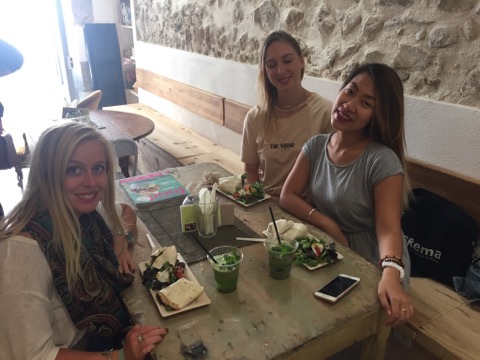 |
| Me with friends from Croatia & Vietnam |
International Business School Makes Learning More Culturally Diverse
My international business class has students from 17 different countries and is taught by a professor from England who lives in France. I believe it is a much more interesting and globally diverse class than learning international business from an American professor in America (That’s not really international).
Language Context
It is interesting our language, American English, has the lowest context in the world. We are very direct and say exactly what we mean. That is different from the romance languages. French is a romance language in which French business communicators will use second-degree communication. With second-degree communication, you say one thing explicitly (the first degree message), but the statement has an unspoken subtext. Good communication is very sophisticated with nuances and layers. Messages are often implied but not plainly expressed.
 |
|
CEA students |
The fact I know this information about ways other countries communicate means I have already learned valuable communication skill.
 |
| Me studying at the beach |
The most important thing I have learned communicating in France is to understand you are a guest in this country. The way to be respectful and nice is somewhat different in France than the U.S. What we might think is okay, they might not. We must remember we are the guests here and we must respect the French language and culture.
Here are some helpful translations you can use when communicating in French
How to formally greet every person
French: "Bonjour Madame/Monsieur/Mademoiselle, comment allez-vous?"
English: "Hello Mrs/Mr/Miss, how are you?"
Recognize French is the Native Language
I have found, if I am starting a complicated sentence at a store with a French person and don’t know how to say it all in French, it works well to take initiative and apologize that I can’t speak French well and not assume everyone should speak English.
French: “Désolé, mon français est mauvais. Parlez-vous anglais?”
English: "Sorry, my French is bad. Do you speak English?"
Always Say Thank You and Goodbye
French: "Merci beaucoup! Au Revoir!"
English: Thank you very much! Goodbye!
Communicate with the intention of practicing French
French: "Votre Anglais est bon, mais puis-je pratiquer le français parce que je veux apprendre le français! Merci!"
English: "Your English is good, but can I practice French because I want to learn French! Thank you!"
 |
| My roommate Sam shopping at a French Market |
Learn How to Communicate in a Culturally Diverse World
I think the way I am learning to communicate and live around culturally diverse people is essential. To learn how to find out what is actually being meant when something different is being said will help me immensely with foreign transactions in the future.
Jamie CM is the Fall 2017 MOJO Blogger in the French Riviera, France. She is currently a Junior studying Communication & Business at Westminster College.








